Consumerism involves a unique way of thinking that promises a shortcut to a "better" life, obtained through a continuous process of accumulating certain fashionable goods and services. Over the last few decades, this has resulted in a rising tide of cheap, short-lived goods produced, used and discarded in increasingly rapid cycles, along the way depleting resources and degrading environmental systems.
Somebody Else’s Problem calls for a radical change in how we think about our material world, and how we design, make and use the products and services we need. Rejecting the idea that individuals alone are responsible for the environmental problems we face, it challenges us to look again at the systems we take for granted in daily life, and their cumulative role in our environmental crisis.
The author presents an overview of the main forces giving rise to modern consumerism, looks more closely at today’s accelerating consumption patterns, and asks why older, more custodial patterns of consumption are in decline. The author concludes with a recommendation of new ways of designing, making and using goods and services that can reduce our excess consumption, but still contribute to a good and meaningful life.
| FindBook |
|
有 1 項符合
somebody else’s problem: consumerism, sustainability and design的圖書 |
 |
$ 5499 | Somebody Else’s Problem: Consumerism, Sustainability and Design
作者:Crocker,Robert 出版社:Greenleaf Pubns 出版日期:2016-12-02 語言:英文 規格:精裝 / 15.9 x 23.5 x 1.9 cm / 普通級  看圖書介紹 看圖書介紹
|
|
|
圖書介紹 - 資料來源:博客來 評分:
圖書名稱:Somebody Else’s Problem: Consumerism, Sustainability and Design
|










